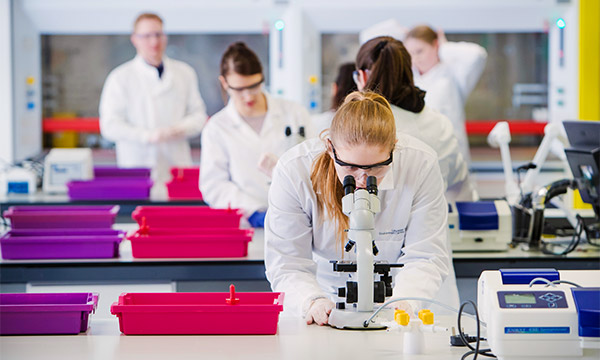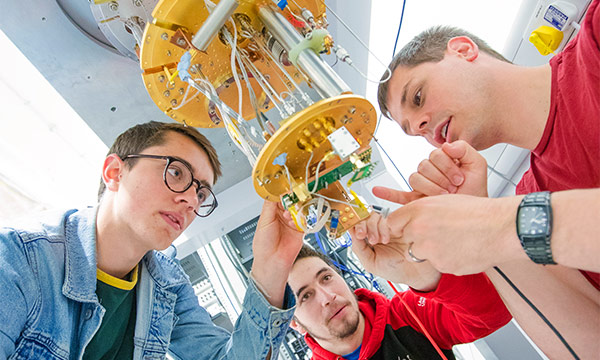The solid rocks that comprise Earth’s upper crust contain a record of change driven by processes originating from the core to the atmosphere over a period exceeding 2 billion years. This Pathway provides the basic skills needed to read this record and understand how Earth has evolved over both long and short periods of time. You will have the opportunity to take a number of field-based modules in both the UK and abroad.
*Please note: some field courses will incur additional costs and are subject to availability
| Year One | Year Two | Year Three |
|---|
Mandatory modules
|
| Biogeochemical Cycles |
Experimental Design and Analysis |
Introduction to Geophysical Techniques |
| Geology |
Geoscience in Practice |
|
| Hydrology: Water in the Environment |
|
|
| Natural Hazards |
|
|
| The Earth's Interior |
|
|
| Optional modules |
| Subject to A level portfolio, you may be required to replace one or more of the above modules with one or more of the following: |
Aquatic Biogeochemistry |
Dissertation |
| Introduction to Environmental Chemistry |
Catchment Hydrology |
Dissertation with Work Placement |
| Numerical Skills I |
*Field Course in the Lake District - Environmental |
Extended Essay |
| Numerical Skills II |
*Field Course in Scotland - Geological Mapping |
*Field Course in Devon - Hydrological Processes |
| |
Soil Science |
*Field Course - Volcanic Processes |
| |
|
Geological Hazards |
| |
|
Hydrogeology |
| |
|
Water Resources Management |
Interactions between organisms, the environment and humanity are often complex. You will receive a thorough grounding in ecological theory and how these biological principles relate to the conservation of wildlife and ecological habitats. The pathway also concerns the practice of ecology and has a strong fieldwork component designed to encourage you to develop your practical skills.
*Please note: some field courses will incur additional costs and are subject to availability
| Year One | Year Two | Year Three |
|---|
| Mandatory modules |
| Aquatic Ecology |
Populations to Ecosystems |
Coral Reef Ecology |
| Biodiversity and Conservation |
Principles of Biodiversity Conservation |
Issues in Conservation Biology |
| Evolutionary Biology |
|
|
| Global Change Biology |
|
|
| Zoology |
|
|
| Optional modules |
|
*Field Course in the Eden Project, Cornwall
|
Environmental Physiology |
Animal Behaviour |
| *Field Course in the Spanish-Doñana |
Evolution |
Dissertation |
| (One of these modules can be taken in place of Aquatic Ecology, Global Change Biology or Zoology) |
Experimental Design and Analysis |
Dissertation with Work Placement |
| |
Field Biology |
Environmental Plant Biology |
| |
Introduction to Eco-innovation |
*Field Course in Kenya - Tropical Biology and Conservation |
| |
Research Design and Delivery |
*Field Course in the Scottish Highlands |
| |
|
Host-Parasite Interactions |
| |
|
Sustainable Agriculture |
This Pathway aims to train you in those areas of natural science (including chemistry, physics, biology, mathematics, geology, physical geography) that are used to understand natural and anthropogenic processes on the surface of the Earth, rivers, lakes, oceans and the atmosphere, as well as Earth’s internal processes, against the backdrop of environmental change.
*Please note: some field courses will incur additional costs and are subject to availability
| Year One | Year Two | Year Three |
|---|
| Mandatory modules |
| Atmosphere, Weather and Climate |
Experimental Design and Analysis |
|
| Biogeochemical Cycles |
|
|
| Geology |
|
|
| Hydrology: Water in the Environment |
|
|
| The Earth's Interior |
|
|
| Optional modules |
| Subject to A level portfolio, you may be required to replace one or more of the above modules with one or more of the following: |
Aquatic Biogeochemistry |
Climate and Society |
| Introduction to Environmental Chemistry |
Atmospheric Science |
Dissertation |
| Numerical Skills I |
Catchment Hydrology |
Dissertation with Work Placement |
| Numerical Skills II |
Data Collection and Analysis |
Extended Essay |
| |
Energy, Economy and the Environment |
*Field Course in Devon - Hydrological Processes |
| |
Environmental Data Visualisation and Analysis |
Global Change and the Earth System |
| |
*Field Course in the Lake District - Environmental |
Hydrogeology |
| |
Soil Science |
The Causes and Consequences of Environmental Radioactivity |
| |
|
Water Resources Management |




